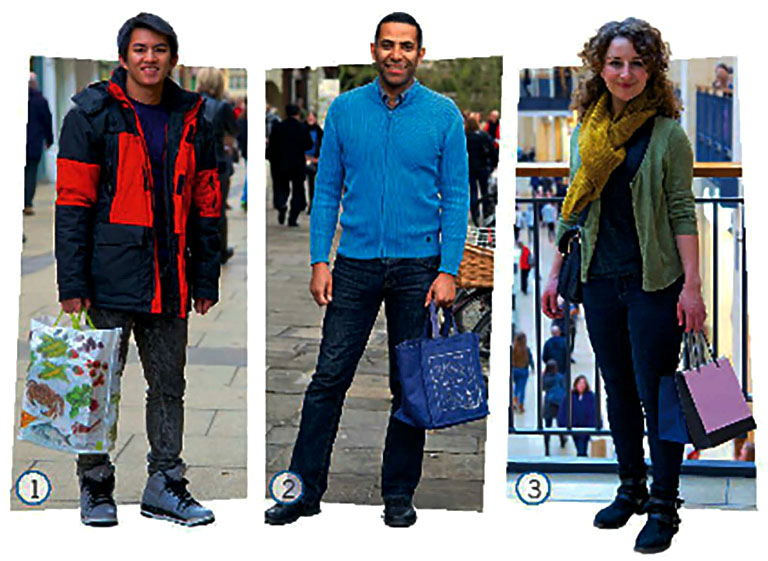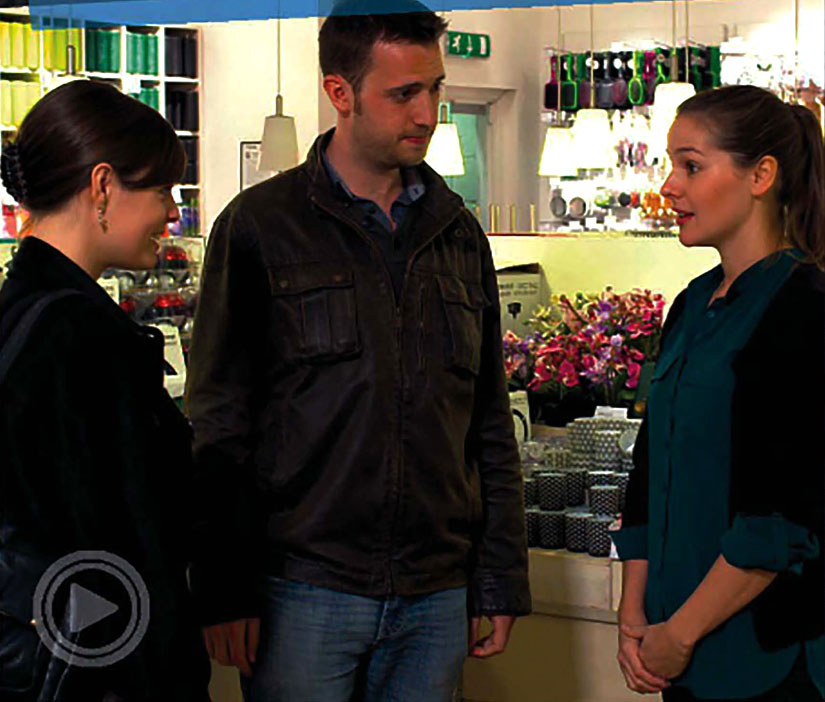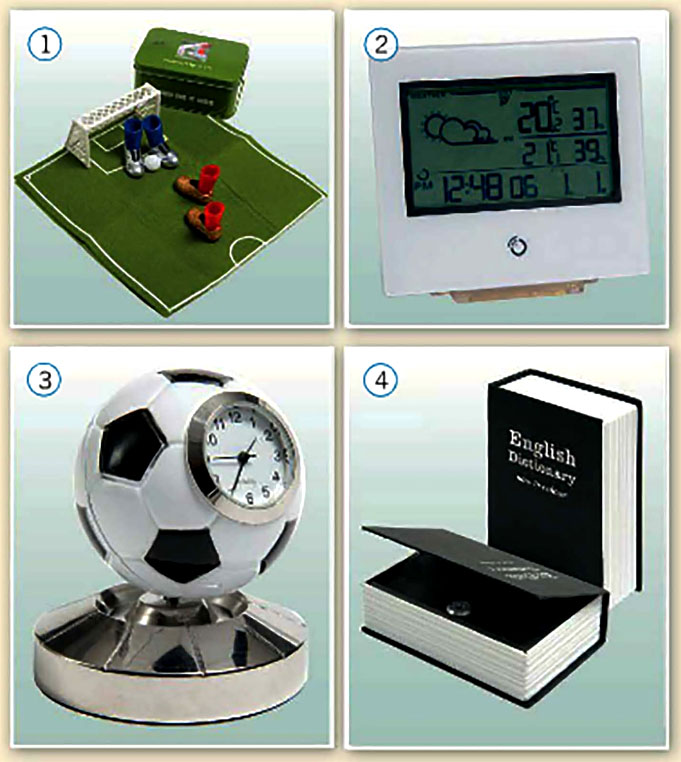Exercise 1
1. Read the information about Philip Wollen and answer the questions.
Philip Wollen was once a very successful banker. However, after he became rich, he had a life-changing experience. On his fortieth birthday, he left his job in banking and decided to give away all his money. It is Philip’s ambition to spend all his money before he dies.
1 What was Philip Wollen’s job?
2 Why did he leave his job?
3 What do you think Philip Wollen has done with his money?
Listen and check your answer.
2. Listen again and answer the questions.
1 What size are the charities that Philip helps?
2 How many charities has he helped?
3 How did the Morning Star orphanage begin?
4 How did Philip’s money help Morning Star?
5 What does the Morning Star’s first child do now?
6 What kind of animals do Edgar’s Mission help?
7 What do they try to teach people?
Answers
1
1 He was a banker.
2 He had a life-changing experience and no longer needed all his money.
3 He has given his money to different charities.
2
1 They are small charities.
2 400–500
3 A man called John Samson gave a home to a hungry baby boy.
4 John used Philip Wollen’s money to make a bigger building and open a new learning centre.
5 He’s a chemist.
6 old farm animals
7 how to look after animals
Audioscripts
After leaving his job, Philip Wollen opened up the Kindness Trust, an organisation that finds small charities in countries where a little bit of money can make a big difference. Wollen then surprises these charities with a gif to continue their good work. So far, he has given money to between 400–500 different charities in 40 countries. His money has built schools, children’s homes and homes for animals.
A special charity for Wollen is the Morning Star orphanage in Bangalore. The orphanage started when, 20 years ago, a man called John Samson found a hungry baby boy in the street. He gave him a home and then he looked for more homeless children to help.
Today the orphanage looks after 60 children. With money from the Kindness Trust, John has made the Morning Star bigger and opened a new learning centre. Wollen went to India to open the centre, meet the children and hear about their lives. One little girl has won a place at a famous women’s college, another child is an excellent chess player and another wants to be a doctor. The little boy that John Samson found in the street has now become a chemist.
And it is not just people that Philip Wollen has helped. He has also given money to a large number of animal charities, such as Edgar’s Mission in Australia, a charity that cares for old farm animals and finds new homes for them. The charity also tries to teach people how to look after animals, so they are healthy and happy.
Wollen thinks everyone can help to make the world a better place for other people and animals. He says, ‘One man can make a difference and every man should try.’
Exercise 2
1. Listen to the people being interviewed.

Who is a …?
◻big spender
◻smart spender
◻non speaker
What has each person bought?
2. Listen again and answer the questions about each speaker.
1 What is he/she saving for?
2 How does he/she feel about borrowing money?
Answers
1
big spender – speaker 3 – some perfume, a necklace
smart spender – speaker 1 – food (for the week)
non spender – speaker 2 – (a lot of) suntan lotion
2
Speaker 1 – 1 a car 2 generally doesn’t like it
Speaker 2 – 1 nothing specific / He’s always saving. 2 He doesn’t think it’s a good idea.
Speaker 3 – 1 nothing 2 She uses her credit card but doesn’t think that’s really borrowing.
Audioscripts
PRESENTER So, in these difficult times, how are people spending their money? Are people still borrowing from the banks? I came to Norwich to talk to shoppers.
Excuse me, sir, do you mind if I ask you a few questions about your spending habits?
SPEAKER 1 Err, OK.
P Can I ask what you’ve got in your bags?
1 I’ve just bought my food for the week. They had some special offers on cheese! I think I’ve got enough for a month.
P Are you saving up for anything at the moment?
1 Yes actually, I’m saving for a car. My girlfriend is moving away to Leeds to study and I want to visit her at weekends. The train is really expensive, so in the end, it’s cheaper to drive.
P Why didn’t you borrow the money for the car?
1 Well, I don’t want to owe money to a bank. I generally don’t like borrowing. I’ve got three credit cards and I’ve never used any of them. I’ve only got them, because of the free stuff you get – travel insurance, cinema tickets, that kind of thing.
PRESENTER And what have you just bought?
SPEAKER 2 Not much! It was all too expensive. But I found a good price on some suntan lotion. So I bought a lot.
P Are you saving up for anything at the moment?
2 Well, I’m always saving, but there isn’t really anything I actually want to buy. I’ve already got everything I need. Why should I spend my money on new things when the things I have are perfectly OK?
Everyone should save for when they’re older. I don’t want to be working when I’m an old man.
P So, I suppose you don’t need to borrow?
2 No, not yet! And I hope I never do. When I can’t afford something, I don’t buy it.
Simple. And I never lend money to other people. Never. You give them money, and you never get it back. Then you lose a friend.
PRESENTER Have you bought anything nice today?
SPEAKER 3 Some perfume … and a small necklace. The necklace was quite expensive … well, very expensive … but I need a new one to go with a dress I’ve just bought.
P Lovely! And are you saving up for anything at the moment?
3 No, not really. I don’t really save up for things, to be honest. If I need something, I just buy it. I’ve got credit cards. I’ve already spent my salary this month, but that’s OK. Life’s too short to worry about money.
P So you don’t mind borrowing money?
3 I don’t borrow money. Well, I use my credit cards, but that’s not really borrowing, is it? Oh! And I got a small loan last year. I haven’t paid it back yet.
Exercise 3
1. Listen to Part 1. What are they shopping for?

2. Listen to Part 2. Which of the products in the pictures do they buy?

3. Listen again. Answer the questions.
1 Why does Mark think ‘Football in a tin’ is a good present?
2 Why does Rachel disagree about the ‘Football in a tin’?
3 Why doesn’t Mark like the weather station?
4 Why does Mark decide not to buy the book money bank?
Answers
1
a birthday present for Leo
2
the football clock
3
1 Because Leo loves football.
2 She isn’t sure Leo loves football.
3 It’s expensive.
4 Mark thinks they should get Leo something sporty.
Audioscripts
Part 1
RACHEL OK, what’s next? Oh, we need to buy a present for Leo.
MARK Really? Why?
R It’s his birthday, remember. Annie told us last week.
M Well, we don’t know him very well.
R Oh, come on. We need to buy him something. Oh, look – how about this shop? I’m sure we can find something in here.
M Hmm.
Part 2
MARK This place is great! I could stay here all day!
RACHEL Well, we’re only here for Leo, remember.
SHOP ASSISTANT Hi, can I help you?
R Er, yes. We’re looking for a present for a friend. It’s his birthday.
SA OK. Are you looking for anything in particular?
R Umm, I don’t know …
M Something fun!
SA OK. What sort of thing does he like? Is he a sports fan?
M Yeah.
R Is he? Does he like sport?
M Yeah, I’m sure.
SA OK … How about this? ‘Football in a tin’. Perfect for a birthday present.
R What is it exactly?
SA It’s a football game. Look, you put the boots on your fingers, there’s a ball …
M This looks perfect! He loves football.
R Does he? I’m not sure. What else do you have?
SA What about this? A weather station.
M Oh – what does it do?
SA Well, it tells you the weather now, and the next day. It’s also an alarm clock.
M Do you have anything cheaper?
SA Well … well, this is a great product. A book money bank.
R A book money bank?
SA Well, you open it here and there’s a place to put your money. To keep it safe.
R Oh, that’s quite nice.
M Yeah, I suppose he might like that.
R OK, we’ve decided.
SA Great …
M On second thoughts, I really think we should get something sporty. Could you show us something else?
SA Oh, I know. What about this? A football clock.
M Brilliant! Let’s get that!
R Well, if you really think he likes football.
M Yeah, of course. He was talking about football last time we saw him. We’ll take it.
R Was he? I don’t remember that.
Exercise 4
1. Listen to four people talking about giving money to charity. Do they support a charity? Which one?
1 Shona 2 Jack 3 Jessica 4 William
2. Listen again. Why do/don’t the people in 1 support a charity? How do they help? Listen and make notes.
Answers
1
1 Shona – Oxfam;
2 Jack – Greenpeace;
3 Jessica – no;
4 William – the National Trust
2
1 Shona: wants people in poorer countries to have happy childhood, like hers; ran a marathon last year; sells cakes at work
2 Jack: wants to save our natural world so children and children’s children can enjoy the world; gives money online; sells calendars
3 Jessica: owes money to parents and government and can’t afford it
4 William: thinks history is important and we need to protect it; collects money door-to-door
Audioscripts
SHONA I support Oxfam. You see, I had a really happy childhood myself and I think it’s important to help other people in poorer countries have happy childhoods. I haven’t got a lot of spare money, but I try and help them in other ways. For example, last year I ran a marathon and people sponsored me, you know, gave me money for doing the run.
I made just over a hundred pounds. And then, once a month, I make cakes and take them to my off ice. I sell pieces of cake to my colleagues for morning tea and give the money to Oxfam.
JACK Well, giving to charity is quite easy really. You can go online and pay with your credit card. I’ve given money to Greenpeace that way a few times recently. And once a year, I sell their calendars – mostly to friends and the people I work with. I think that helping to save our natural world is the most important thing you can do. I think I should do something now – so that my children and my children’s children can enjoy the kind of world that I live in.
JESSICA Of course, I think it’s important to … well, that people give money to charities. But actually, I haven’t got a lot of money myself. I owe money to my parents and I have to pay back the government for my university study and … In fact, I’ve never given any money to a charity. I can’t really afford it.
WILLIAM Our history is really important and we need to protect it. When I think of all the old buildings that we’ve already lost, it’s terrible. So, once every six months I go around my neighbourhood and collect money door-to-door for the National Trust. I tell people about local places the National Trust want to protect and they are usually very generous.
Exercise 5
1. Listen to the conversation. Underline the correct people to complete the sentences.
1 Anita / Gary / Mike gave a man something that he didn’t have.
2 Anita / Gary / Mike is helping a friend who doesn’t have much money.
3 Anita / Gary / Mike does something nice for other people every week.
4 Anita / Gary / Mike asked other people to lend her things.
5 Anita / Gary / Mike made friends with the person he helped.
2. Listen to the conversation again and tick (✓) the correct answers.
1 Why is Anita’s neighbour having a party?
a It’s her daughter’s birthday.
b It’s her son’s birthday.
c It’s her husband’s birthday.
2 Where is the birthday party going to be?
a At the local beach.
b In the back garden.
c In the local park.
3 What did the Greek man do?
a He borrowed an umbrella from Gary.
b He lent an umbrella to Gary.
c He borrowed Gary’s coat.
4 What happened when Gary saw the man again?
a They had lunch.
b They had a cup of tea.
c They went on holiday together.
5 What has Gary just bought?
a A ticket to the theatre.
b A ticket to Adelaide.
c A ticket to Greece.
6 How does Mike try and make people smile?
a He gives them money.
b He puts his arms around them.
c He makes friends with them.
Answers
Audioscripts
DJ And now it’s time for today’s talking point. What’s the nicest thing you have ever done for someone? Have you given something expensive away to someone or just made someone smile? Call, text or email me now. First on is Anita from Perth.
ANITA Hello, Baz. My neighbour hasn’t got a job at the moment and it’s her daughter’s thirteenth birthday today. I know she couldn’t afford to have a party so I thought I could help.
DJ And what have you done?
A I’ve borrowed a stereo from my brother and some disco lights from my friend. And we’ve turned part of her back garden into a beach with lots of sand I got at the local beach. Lots of the neighbours have given some food and we’re going to have a beach party and disco this evening.
DJ That must have made your neighbour smile. Thanks for your call, Anita, and have a great night. What a nice woman. Next we have Gary from Adelaide. What’s the nicest thing you’ve done?
GARY Hi, Baz. Last year I was in the city centre when a tourist asked me how to get to the museum. I gave him directions and then we started talking. He was from Greece and he was really friendly. Then it started raining really hard. He didn’t have a coat so I lent him my umbrella. I asked him to bring it to my house when he was leaving Adelaide and then I forgot about it. Four days later he brought it to my house. I certainly didn’t expect that. I invited him in and we had a cup of tea together. We got on well and we became friends. When he left, he invited me to visit him in Greece next summer. I’ve been saving up all year and I’ve just booked my ticket. I can’t wait!
DJ That’s a great story, Gary. Enjoy your holiday! Before we go, I’ve had an email from Mike in Darwin. He has started a group called ‘Give someone a hug, make someone smile’. Every Sunday he walks around the city centre with his friends, giving people hugs and hopefully making them smile. Good luck with that, Mike – and be careful!
